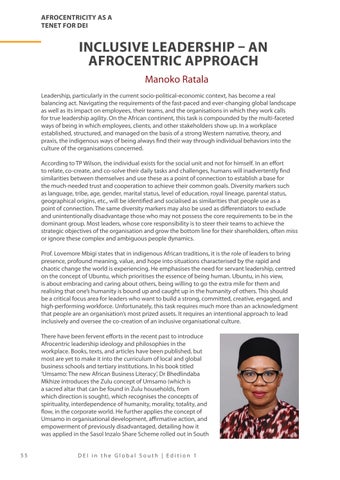AFROCENTRICITY AS A TENET FOR DEI
INCLUSIVE LEADERSHIP – AN AFROCENTRIC APPROACH Manoko Ratala Leadership, particularly in the current socio-political-economic context, has become a real balancing act. Navigating the requirements of the fast-paced and ever-changing global landscape as well as its impact on employees, their teams, and the organisations in which they work calls for true leadership agility. On the African continent, this task is compounded by the multi-faceted ways of being in which employees, clients, and other stakeholders show up. In a workplace established, structured, and managed on the basis of a strong Western narrative, theory, and praxis, the indigenous ways of being always find their way through individual behaviors into the culture of the organisations concerned. According to TP Wilson, the individual exists for the social unit and not for himself. In an effort to relate, co-create, and co-solve their daily tasks and challenges, humans will inadvertently find similarities between themselves and use these as a point of connection to establish a base for the much-needed trust and cooperation to achieve their common goals. Diversity markers such as language, tribe, age, gender, marital status, level of education, royal lineage, parental status, geographical origins, etc., will be identified and socialised as similarities that people use as a point of connection. The same diversity markers may also be used as differentiators to exclude and unintentionally disadvantage those who may not possess the core requirements to be in the dominant group. Most leaders, whose core responsibility is to steer their teams to achieve the strategic objectives of the organisation and grow the bottom line for their shareholders, often miss or ignore these complex and ambiguous people dynamics. Prof. Lovemore Mbigi states that in indigenous African traditions, it is the role of leaders to bring presence, profound meaning, value, and hope into situations characterised by the rapid and chaotic change the world is experiencing. He emphasises the need for servant leadership, centred on the concept of Ubuntu, which prioritises the essence of being human. Ubuntu, in his view, is about embracing and caring about others, being willing to go the extra mile for them and realising that one’s humanity is bound up and caught up in the humanity of others. This should be a critical focus area for leaders who want to build a strong, committed, creative, engaged, and high-performing workforce. Unfortunately, this task requires much more than an acknowledgment that people are an organisation’s most prized assets. It requires an intentional approach to lead inclusively and oversee the co-creation of an inclusive organisational culture. There have been fervent efforts in the recent past to introduce Afrocentric leadership ideology and philosophies in the workplace. Books, texts, and articles have been published, but most are yet to make it into the curriculum of local and global business schools and tertiary institutions. In his book titled ‘Umsamo: The new African Business Literacy’, Dr Bhedlindaba Mkhize introduces the Zulu concept of Umsamo (which is a sacred altar that can be found in Zulu households, from which direction is sought), which recognises the concepts of spirituality, interdependence of humanity, morality, totality, and flow, in the corporate world. He further applies the concept of Umsamo in organisational development, affirmative action, and empowerment of previously disadvantaged, detailing how it was applied in the Sasol Inzalo Share Scheme rolled out in South 55
DEI in the Global South | Edition 1



































